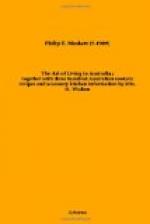The Hochheim vineyards are situated, as I have previously indicated, on the banks of the Maine, several miles above its confluence with the Rhine. There is one exceptionally fine Hochheim growth which comes from the vineyard of the “Dechanei,” or deanery. True Hochheinner is a remarkably aromatic wine, and possesses both body and fire. Indeed, it contains as large a percentage of alcohol as the so-called noble Steinberger—the most spirituous of the Rhenish growths—with more sweetness. It consequently lacks that subdued acidulous freshness of flavour which is such a marked characteristic of the wines of the Rheingau.
Some reference to sherry and port is necessary, because they are both types of wines that are widely known, and consequently ally remarks concerning, them are of value by comparison. It would appear that with most sherry, and certainly with all port, there is an addition of alcohol to the wine. Even the wines which are sold in England under the name of “natural sherry” contain from 13.2 to 15.5 per cent. of alcohol. Beyond all question, therefore, from 1 1/2 to 3 1/2 per cent. of alcohol must have been added, for no “natural sherry” should ever contain more than 12 per cent. of alcohol. Some sherries, however, have been introduced with an alcoholicity of from 12 to 13.6 per cent., with the following, characters: The taste is freely vinous, rich, pure, mellow, and quite free from heat or the taste of added spirit. But fashion has much to do with the type of sherry in request; thus the colour has varied from time to time. In the same way, too, a taste for dry sherries arose with the Manzanilla epoch, only to be carried to excess. As with all other wines, a certain age in sherry is desirable; the ethers become developed during this period, and impart a rich flavour to it. In the course of time, however, sherry falls off so much that it is only fit for giving flavour to young wine.
In the matter of port, also, it may confidently be asserted that not a single drop is sold that does not contain a certain amount of added brandy. That is to say, all port wine, without exception, is brandied. The effect of the brandy is to keep the wine quiet; it prevents it from undergoing any fermentation; and, what is more, it keeps it from changing, no matter whether the climate be hot or cold. Messrs. Thudicum and Dupre state that a perfectly natural port has 9 per cent. of alcohol as the lowest, and 13.8 per cent. as the highest limit.




